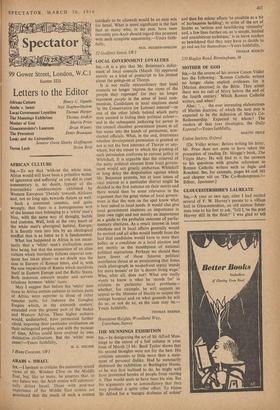LOCAL GOVERNMENT LOYALTIES SIR,—It is a pity that Mr. Betjeman's
indict- ment of local councils (March 16) appeared merely as a kind of postscript to his protest about the goings-on at Thorpe.
It is not really extraordinary that local councils no longer 'express the views of the people they represent' for they no longer represent people in the sense of local com- munities. Candidates in local elections stand 'in the Conservative (or Labour) interest'—or one of the other labels behind which party men succeed in hiding their political colour—. and in the subsequent jockeying for power in the council chamber government passes in all but name into the hands of permanent, non- elected officials. What, in the end, determines whether development permission is granted or not is not the best interests of Thorpe or any- where, but the extent to which the granting of such permission conforms to current policy in Whitehall. It is arguable that the removal of the party political element from local govern- ment would not greatly embarrass Whitehall or long delay the despoliation against which Mr. Betjeman protests, but at least issues of vital interest to a particular district might be decided in the first instance on their merits and there would then be some relevance in the argument that the great virtue of local govern- ment is that the men on the spot know what is best suited to local needs. It would also give local government elections an importance in their own right and not merely an importance as a guide to the probable outcome of parlia- mentary elections. As a result interest in local elections and in local affairs generally would be revived and all sides would benefit from the fact that candidates would have to state their policy as a candidate in a local election and not merely as the mouthpiece of national political aspirations. Perhaps we should then have fewer of those fatuous political manifestos thrust at us proclaiming that Jones (with photograph in washed-out sepia) 'stands for more houses' or for 'a decent living wage.' Who, after all, does not? What one really wants to know is what he 'stands for' in relati'on to particular local problems— whether, for example, he will support an appeal to the Minister of Health to reopen the cottage hospital and on what grounds he will do so, or not do so, as the case may be.— Yours faithfully,
THOMAS HARPER
Harestone Heights, Woodland Way, Caterham, Surrey


































 Previous page
Previous page